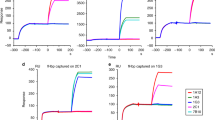Abstract
BOYD1 suggested that the closeness of the alpha and beta optima is a property of antitoxic sera due to the narrowness of the flocculation zone in such systems ("extreme H type"). Boyd and Purnell2 gave theoretical reasons why the two optima cannot coincide and suggested that the true optimum, designated epsilon, lies between them.
This is a preview of subscription content, access via your institution
Access options
Subscribe to this journal
Receive 51 print issues and online access
$199.00 per year
only $3.90 per issue
Buy this article
- Purchase on Springer Link
- Instant access to full article PDF
Prices may be subject to local taxes which are calculated during checkout
Similar content being viewed by others
References
Boyd, W. C., J. Exp. Med., 74, 369 (1941).
Boyd, W. C., and Purnell, M. A., J. Exp. Med., 80, 289 (1944).
Miles, A. A., Brit. J. Exp. Path., 14, 43 (1933).
Svedberg, T., and Hedenius, A., Biol. Bull., 66, 191 (1934).
Author information
Authors and Affiliations
Rights and permissions
About this article
Cite this article
ELEK, S., LEVY, E. Flocculation Optima in Diphtheria Toxoid-Antitoxin Systems. Nature 164, 353–354 (1949). https://doi.org/10.1038/164353a0
Issue Date:
DOI: https://doi.org/10.1038/164353a0
Comments
By submitting a comment you agree to abide by our Terms and Community Guidelines. If you find something abusive or that does not comply with our terms or guidelines please flag it as inappropriate.



